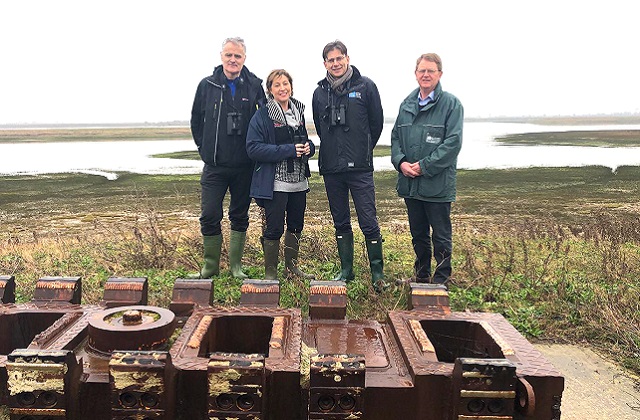
The Environment Minister Rebecca Pow toured RSPB’s Wallasea Island in Essex yesterday, ahead of the introduction of the landmark Environment Bill in the near future, to see first-hand the extensive efforts to help the coast and its wildlife adapt in the face of climate change. Joining the Minister and RSPB’s Director of Conservation, Martin Harper, were Natural England's Area Manager Aidan Lonergan and Paul Miller - Environment Agency’s Project Manager. The vast area will address the biggest environment priorities of our age - including restoring and enhancing nature.
Following the visit, the Minister gave an interview to BBC Radio Essex about the importance of sites like Wallasea for people and wildlife. The item aired during the station’s afternoon Dave Monk show.
RSPB’s Wallasea Island Nature Reserve, home to the Wallasea Island Wild Coast Project, was created using more than three million tonnes of earth from the tunnels and shafts created by the Crossrail scheme in London. Spanning 900 hectares, it is Europe’s largest coastal habitat restoration project, aiming to restore marshland lost due to coastal erosion and rising sea levels, helping to reduce flood risk. It is also a great example of the importance of local partnerships to deliver effective nature recovery efforts with Defra, Environment Agency and Natural England, along with RSPB, all playing a role in the scheme.
The habitats - mudflats, saltmarsh, brackish marsh and saline lagoons - provide an increasingly popular home to a wide range of birds, including waders and migratory species such as brent geese and avocets, and other wildlife. The site also locks up two tonnes of carbon per hectare per year.
During the visit, the Minister met with RSPB representatives, including Martin Harper, to discuss the Government’s views on environmental protection and efforts taken to date by the charity to restore coastal environments.
Environment Minister Rebecca Pow said:
This Government is committed to tackling the climate and nature emergency and leaving our precious environment in a better state than we inherited for future generations to enjoy.
Our commitments to the environment are ambitious and our forthcoming Environment Bill – the first in over 20 years - will drive a world-leading programme of reform to address the biggest environmental priorities of our age.
It was inspiring to see first-hand the remarkable success story at Wallasea – a world-leading example of coastal restoration - and to discuss with RSPB their ambitions not only for the Wild Coast Project, but for other coastal schemes and wider environmental protections for the UK’s nature into the future.
RSPB’s Director of Conservation, Martin Harper said:
Wallasea Island is the largest coastal habitat creation of its kind in Europe. It’s an example of how we must adapt to rising sea levels by recreating an ancient wetland landscape of mudflats, saltmarsh, lagoons and pasture that store carbon, support wildlife and benefit the local communities.
It’s a beacon of hope, perfectly highlighting how we should respond to the ecological and climate emergency.
The visit comes as yet another step that follows the Government’s commitment to marine protection and follows a recent announcement of two new and extended SPAs in Solent and Teesmouth. It also follows the announcement of the upcoming Seabird Conservation Strategy and comes ahead of the introduction of the Environment Bill.